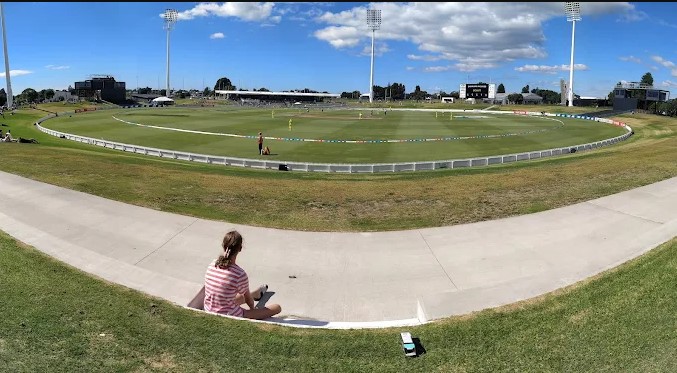Mount Maunganui: Mount Maunganui’s Bay Oval is one of New Zealand’s premier cricketing venues. Nestled near the beach, it offers both players and spectators a beautiful backdrop and competitive cricketing conditions. While the pitch behavior and weather often get the spotlight, boundary dimensions play a crucial role in shaping the outcomes of games—particularly in the shorter formats like ODIs and T20s.
Table of Contents
This article delves into the boundary lengths of the Bay Oval, how they compare to other major stadiums, and their impact on match strategy.
Overview of Bay Oval
Bay Oval is located in Mount Maunganui, Tauranga. It has hosted a range of domestic and international fixtures including ODIs, T20Is, and Test matches since gaining international status in 2014. It has become especially popular for white-ball cricket.
Stadium Details:
| Feature | Specification |
|---|---|
| Location | Mount Maunganui, Tauranga, New Zealand |
| Seating Capacity | ~10,000 |
| Pitch Type | Drop-in pitch |
| Ends | Mount Maunganui End, Tauranga End |
Boundary Lengths at Bay Oval
Unlike many of the larger stadiums in Australia or India, Bay Oval has relatively short boundaries, which makes it an exciting venue for high-scoring games. However, the lengths are not uniform and can vary depending on the pitch location and match setup.
Standard Boundary Lengths (Approximate):
| Boundary Direction | Distance from Center (in meters) |
|---|---|
| Straight (Both Ends) | 70 – 72 m |
| Square (Off-side & Leg-side) | 63 – 67 m |
| Third Man / Fine Leg | 58 – 62 m |
| Long On / Long Off | 68 – 71 m |
| Deep Mid-Wicket / Deep Extra Cover | 64 – 68 m |
These values can fluctuate slightly depending on pitch positioning, which is adjusted to reduce wear and tear in one area of the square.
Comparison with Other New Zealand Grounds
When compared with other prominent New Zealand stadiums, Bay Oval has moderately short boundaries.
| Stadium | Straight Boundary (m) | Square Boundary (m) |
|---|---|---|
| Bay Oval, Mount Maunganui | 70–72 | 63–67 |
| Eden Park, Auckland | 55–60 | 65–68 |
| Hagley Oval, Christchurch | 75–78 | 68–72 |
| Basin Reserve, Wellington | 70–73 | 66–70 |
Impact on Match Strategy
1. Bowling Plans
Bowlers, especially spinners and pacers during the death overs, have to be highly aware of the boundary dimensions. Short square boundaries mean slower balls and wide yorkers are often preferred to limit scoring opportunities.
2. Batting Aggression
Due to shorter square and straight boundaries, batsmen often take more risks. It’s a favorite hunting ground for big hitters, particularly in T20s. Players like Martin Guptill and Devon Conway have used the ground’s dimensions to great effect.
3. Fielding Placement
Captains tend to set deeper square boundaries and try to protect the shorter straight hits with long-on and long-off in place. The side with better athleticism in the field often gains an edge, as saving 2s and converting boundaries becomes critical.
High-Scoring Records at Bay Oval
| Format | Highest Team Score | Opposition | Year |
|---|---|---|---|
| ODI | 371/7 | New Zealand vs Sri Lanka | 2019 |
| T20I | 243/5 | New Zealand vs West Indies | 2020 |
| Test | 615/9 dec | New Zealand vs Bangladesh | 2019 |
These scores demonstrate that the ground heavily favors batsmen, partly due to the manageable boundary sizes and a typically flat pitch.
Weather and Wind Influence
Mount Maunganui is a coastal venue, and wind conditions can significantly impact boundary clearances. Often, teams batting with the wind at their backs during one end exploit the shorter boundary. Smart teams use wind awareness to choose which end to bowl from and how to position their fielders.
The Bay Oval at Mount Maunganui offers a dynamic and entertaining venue largely because of its well-balanced—but slightly batsman-friendly—boundary dimensions. With straight boundaries around 70 meters and square ones slightly shorter, players often find scoring more achievable here than in larger international stadiums. However, the variability introduced by pitch positioning, wind direction, and match conditions keeps both bowlers and batters on their toes.
As cricket continues to evolve with power-hitting and innovative bowling strategies, understanding the micro-details of grounds like Bay Oval becomes increasingly important—not just for players and coaches, but also for fans and analysts who follow the game closely.


